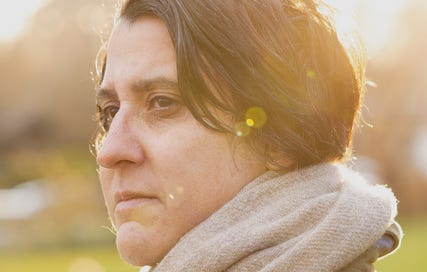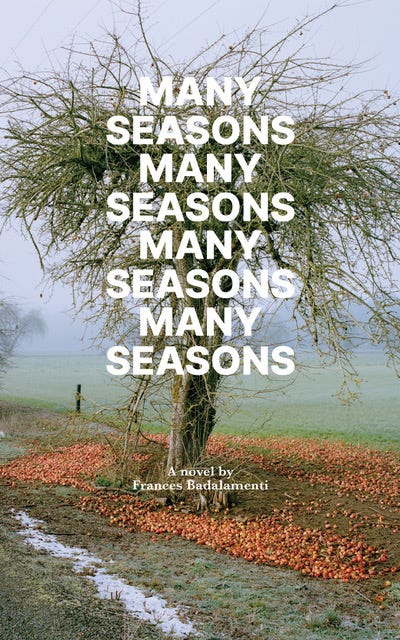The Memoir Land Author Questionnaire #54: Frances Badalamenti
"Instead of expanding into scene from memory, I allowed myself the freedoms that come with fiction-writing..."
Since 2010, in various publications, I’ve interviewed authors—mostly memoirists—about aspects of writing and publishing. Initially I did this for my own edification, as someone who was struggling to find the courage and support to write and publish my memoir. I’m still curious about other authors’ experiences, and I know many of you are, too. So, inspired by the popularity of The Oldster Magazine Questionnaire, I’ve launched The Memoir Land Author Questionnaire.
Here’s the 54th installment, featuring , author most recently of Many Seasons, a work of autofiction. -Sari Botton
Frances Badalamenti is the author of the novels I Don’t Blame You, Salad Days and most recently, Many Seasons. Her essays, stories and interviews can be found at The New Yorker, The Believer Magazine, BOMB Magazine, Vol.1 Brooklyn, and elsewhere. She teaches writing workshops and works individually as a mentor for writers. Frances lives in Portland, Oregon.
—
How old are you, and for how long have you been writing?
I am 51. I have been writing since my early 20s, but more seriously since my mid-30s.
What’s the title of your latest book, and when was it published?
My latest book is called Many Seasons and it was published on November 12th.
What number book is this for you?
This is book #3. Third is the charm, right?
How do you categorize your book—as a memoir, memoir-in-essays, essay collection, creative nonfiction, graphic memoir, autofiction—and why?
This book is closest to what might be considered autofiction. I call it writing the self. How this book came to be is that I collected vignettes from my everyday life and built narrative from those snapshots. Instead of expanding into scene from memory, I allowed myself the freedoms that come with fiction-writing, such as creating composites and playing with form a bit more than what is often expected with the other genres.
What is the “elevator pitch” for your book?
Many Seasons is a sparsely written and intimate account of a long-term relationship. It is about reckoning with the prescribed roles of both partnership and motherhood as a female-identifying person. It follows Ana, an emerging writer, through her struggles with her role as a non-income producing householder. We witness her episodes of challenging and oftentimes debilitating anxiety and eventual sobriety. But more than anything, Many Seasons is a deep meditation on the existential struggles of contemporary life.
This book is closest to what might be considered autofiction. I call it writing the self. How this book came to be is that I collected vignettes from my everyday life and built narrative from those snapshots. Instead of expanding into scene from memory, I allowed myself the freedoms that come with fiction-writing, such as creating composites and playing with form a bit more than what is often expected with the other genres.
What’s the back story of this book including your origin story as a writer? How did you become a writer, and how did this book come to be?
I came to writing after I lost my mother. She died two months before I became a mother myself, so I was at this existential crossroads, and I needed to find a way to make sense of what I was feeling: the joys and the sorrows. I took writing workshops for years and I continued to immerse myself in both reading and writing, which I see as an MFA alternative of sorts.
I wrote and published mostly personal essay, which I still believe is a great place to start, because it is such an accessible form. After a few years of this immersive self-study, I began working on a manuscript that became my first book, I Don’t Blame You, which was based in and around that motherloss story. That book taught me how to write a book. After that, I quickly wrote Salad Days, which is a 20-something coming of age story about group housing, making dumb life choices like sleeping with the wrong people and a failed first marriage.
I see Many Seasons as the final in a triptych of sorts, a way to make sense of my life. I had been collecting these vignettes for maybe ten years, mostly when I needed a break from book-writing. It was during the pandemic that I turned back to what I had collected and began building narrative from the material. It felt like the perfect project to work on at the time, writing about domestic angst when I was stuck at home with my spouse and child.
What were the hardest aspects of writing this book and getting it published?
This book was not hard to write necessarily but it was hard to turn back to some of the material that I had been archiving through the years. I had a lot of unresolved traumas from my youth and young adulthood that had manifested into anxiety, so a lot of this book is about working my way through some of that gnarly stuff and coming out on the other side a stronger, more resilient, sober person. I had to relive a lot of difficult scenes from my life, so that was hard, but the writing was quite enjoyable.
Getting Many Seasons published was not such a struggle. My first book was a struggle to publish, and I can do a Ted Talk on that grueling process, so I feel like I had paid my dues.
I had published an excerpt from the manuscript-in-progress in a local Portland literary magazine called Buckman Journal. I really enjoyed working with the editor and so I asked them if they would be interested in the full manuscript, and they were. Previous to submitting the full manuscript to the Buckman folks, I had made a few half-assed attempts at seeing if any literary agents were interested in taking on the project, but nobody bit and I didn’t have the bandwidth to keep trying. I decided to go with Buckman and the experience has been pretty amazing. I couldn’t ask for a better publishing team.
How did you handle writing about real people in your life? Did you use real or changed names and identifying details? Did you run passages or the whole book by people who appear in the narrative? Did you make changes they requested?
I write about who I need to write about, because I don’t feel that the people who I base my characters on are my audience—they are often composites anyhow. My marriage is the main focal point and inspiration for this book, but it is also about all my long-term relationships and about long-term relationships in general. Plus, my spouse opts not to read my work, which I feel is a good thing. He is not a reader (and certainly not a reader of autofiction), so he would not understand what the fuck I am doing with this eccentric nonlinear material anyhow.
Because of these veils, I rarely run things by anyone in my books. But I do write to protect myself and to protect those who might be the inspiration for my writing. It may not read that way (because that is one of the hallmarks of writing the self), but this book speaks more to the universal than it does to the actual.
Many Seasons is a sparsely written and intimate account of a long-term relationship. It is about reckoning with the prescribed roles of both partnership and motherhood as a female-identifying person. It follows Ana, an emerging writer, through her struggles with her role as a non-income producing householder. We witness her episodes of challenging and oftentimes debilitating anxiety and eventual sobriety. But more than anything, Many Seasons is a deep meditation on the existential struggles of contemporary life.
Who is another writer you took inspiration from in producing this book? Was it a specific book, or their whole body of work? (Can be more than one writer or book.)
I would say my biggest influences were the work of Tove Ditlevsen, Kate Zambreno, and Olga Ravn. All female-identifying writers who write the self in and around householding, motherhood and writing.
What advice would you give to aspiring writers looking to publish a book like yours, who are maybe afraid, or intimidated by the process?
Publishing this kind of personal writing can feel intensely vulnerable. When my first book published, I had a bit of a come apart. Work on yourself as much as you work on your writing. And more than anything, learn how to take rejection.
What do you love about writing?
Writing gives me hope. It’s hard work but I feel like it has made me into a strong, resilient, insightful person.
What frustrates you about writing?
I don’t make very much money from writing, not yet at least. A living wage would be nice.
What about writing surprises you?
Writing is magical. I know that sounds super woo woo, but writing can take you to places and parts of yourself that you didn’t even know existed.
Does your writing practice involve any kind of routine or writing at specific times?
When I first started writing, it was when my child was young, and I carved out specific times to write while he was in school. But now I teach writing workshops and I mentor writers, so I do most of my writing during my months off from paid work. I work for three months teaching and mentoring and then I take a month off to write, and then repeat—that is how I structure my writing cycles now and it works well for me.
I see Many Seasons as the final in a triptych of sorts, a way to make sense of my life. I had been collecting these vignettes for maybe ten years, mostly when I needed a break from book-writing. It was during the pandemic that I turned back to what I had collected and began building narrative from the material. It felt like the perfect project to work on at the time, writing about domestic angst when I was stuck at home with my spouse and child.
Do you engage in any other creative pursuits, professionally or for fun? Are there non-writing activities do you consider to be “writing” or supportive of your process?
I listen to a ton of podcasts, and I watch a lot of stand-up comedy and documentaries, which is a deep study of the human condition. The human condition is a big part of my work as a writer (and person).
What’s next for you? Do you have another book planned, or in the works?
I plan to work on a book that combines narrative nonfiction, writing craft and personal narrative. I have been teaching and writing the self for a few years now and I have been studying some threads that I feel would make for an interesting hybrid book. I plan to start working on a proposal this winter.







How fun to see Frances in the questionnaire! I attended a Writing the Self workshop earlier in the fall. I am not exaggerating to say it was life-altering for me. Her teaching feels light-handed, while she creates a container for writers to be vulnerable, open-hearted, and kind to each other. She is funny, and smart and introduced me to many new writers. I look forward to reading the new book. Go Frances!
I hadn't come across Frances' work before but after reading the elevator pitch for Many Seasons here I'm definitely going to seek it out. It rang a lot of bells with me.